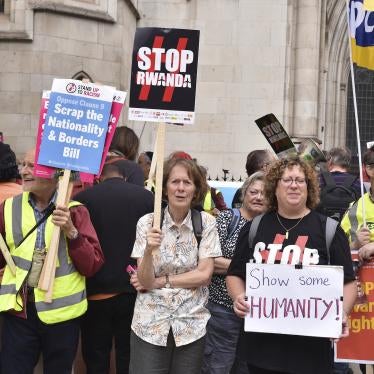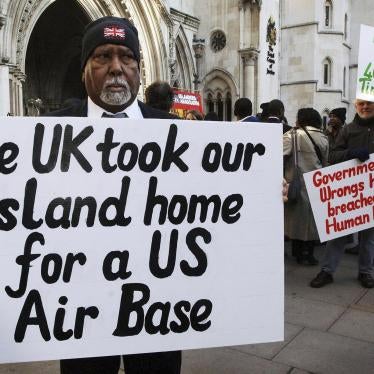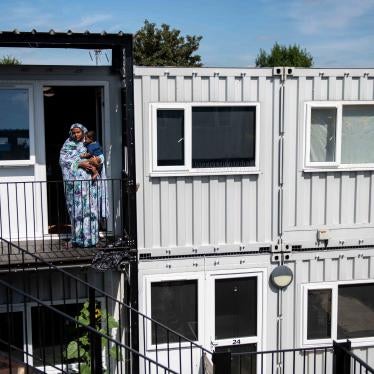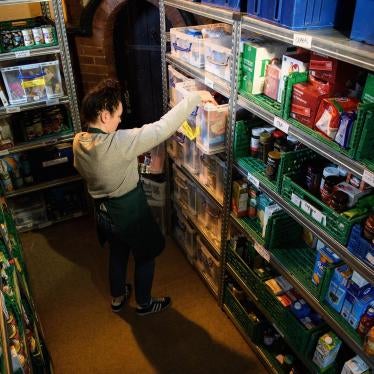November 15, 2022
This text is an edited version of the original joint UK civil society statement which can be accessed here in a format including the logos of signatory organizations. The text below has been amended for publication on Human Rights Watch’s website to ensure consistency with house style.
On Thursday November 10 member states of the UN Human Rights Council called on the UK Government to take action to better realize rights in the UK during the ‘Universal Periodic Review’,[i] particularly for disabled people, children, women, Black and other racialized groups, migrants and those seeking asylum.
The review highlighted a wide range of areas where the UK Government is failing to meet its international legal obligations including:
- Deep concerns that the ‘Rights Removal Bill’ will undermine the protections and remedies provided by the Human Rights Act 1998 and the European Convention on Human Rights
- The rights of children. Specific recommendations were made to:
- Develop a child rights action plan
- Raise the age of criminal responsibility to at least 14
- End detention of children in adult prisons, solitary confinement, and racial disproportionality in the youth justice system
- Ensure unaccompanied asylum-seeking children have their family unification rights respected
- The incompatibility of the Migration and Economic Development Partnership with Rwanda, which will see asylum seekers expelled to Rwanda, with the UK’s obligations, including under the 1951 Refugee Convention
- Rising levels of poverty, including food insecurity and access to adequate housing, with the particular effects this has on children and disabled people
- Rising hate crime levels across the UK, including in relation to disabled people, women, people of colour and in relation to religious background
- Discrimination faced by Trans people in the UK in the realization of a large range of their rights
- The need to bring international human rights into domestic legislation, including the right to a clean, healthy and sustainable environment
- The removal of reservations to the Istanbul Convention to ensure adequate protection of all women and girls, including migrants, from violence
As civil society organizations across the UK we call upon the UK Government to:
- accept the recommendations made during the Universal Periodic Review
- take action (including legal changes) to implement recommendations made during this, and previous reviews
- commit to an improved engagement with civil society and affected people (including particularly impacted groups highlighted above) during each phase of the review, including the implementation of recommendations
- adopt a National Human Rights Action Plan (NHRAP), which encompasses economic, social and cultural rights, building on the good practices demonstrated in Scotland,[ii] which would include consistent and meaningful dialogues with civil society to ensure wider protection of human rights
- establish a ‘National Mechanism for Reporting and Follow-up’ (NMRF) to coordinate the implementation of recommendations from the UPR and provide transparency on progress of this work
- reaffirm its commitment to human rights and its international obligations, in particular by scrapping current plans to undermine the Human Rights Act by replacing it with a Rights Removal Bill and confirming its commitment to implement the decisions of the European Court of Human Rights whether interim or final.
We make these calls with the aim of working together with the UK and devolved governments in the hope of meaningful use of the Universal Periodic Review and the better protection of human rights in the UK. The UK continues to position itself as a world leader in terms of human rights and the Universal Periodic Review is an excellent opportunity to illustrate this commitment on the global stage.
- Alliance for Choice
- Alliance for Youth Justice
- Article 12 in Scotland
- Article 39
- Association for Real Change
- Asylum Aid
- Belfast Feminist Network
- Birthrights
- Black Equity Organisation
- Black South West Network
- British Institute of Human Rights
- C-Change Scotland
- Carers Trust
- Carers Trust Scotland
- Carers Trust Wales
- CEDAW in Law
- Centre for Military Justice
- Children in Scotland
- Children’s Rights Alliance for England
- Clan Childlaw
- Diverse Cymru
- Edinburgh Development Group
- Empower Women for Change
- End Violence Against Women Coalition
- Equally Ours
- Face Equality International
- Fair Vote UK
- Faith Voices for Reproductive Justice
- Families Outside
- Focus The Identity Trust
- Forward South Partnership
- Freedom from Torture
- Health and Social Care Alliance Scotland (the ALLIANCE)
- Helen Bamber Foundation
- HEReNI
- Human Rights Consortium Scotland
- Human Rights Watch
- Imaginate
- Includem
- Inclusion North
- INQUEST
- Joint Council for the Welfare of Immigrants
- Just Fair
- Just For Kids Law
- JustRight Scotland
- Law Centres Network
- Lawyers Against Poverty
- Liberty
- medConfidential
- Mermaids
- Migrant Voice
- Northern Ireland Rural Women Network
- Observatory on Human Rights of Children (Wales)
- One Parent Families Scotland
- Oxfam GB
- Prisoners' Advice Service
- Race Equality First
- Reclaim the Agenda
- The Refugee Council
- René Cassin
- Rights & Security International
- Rory O’Connell, Professor of Human Rights and Constitutional Law, Ulster University
- Scottish Childminding Association (SCMA)
- Scottish Women’s Aid
- Scottish Young Carers Services Alliance
- Tai Pawb
- The Challenging Behaviour Foundation
- The International Bar Association’s Human Rights Institute
- The PILS Project
- TransActual UK
- Together (Scottish Alliance for Children’s Rights)
- UNISON
- UNJUST CIC
- Unlock Democracy
- VoiceAbility
- Welsh Centre for International Affairs
- WISH
- With Kids
- Women’s Equality Network (WEN) Wales
- Women’s Platform
- Women’s Resource and Development Agency
- York Human Rights City Network Executive
[i] Every four and a half years the UK undergoes a human rights review, called the ‘Universal Periodic Review’, when other member states of the Human Rights Council at the United Nations review the UK’s human rights record and make recommendations.
[ii] See in particular Scotland’s National Action Plan for Human Rights (SNAP and SNAP 2)








